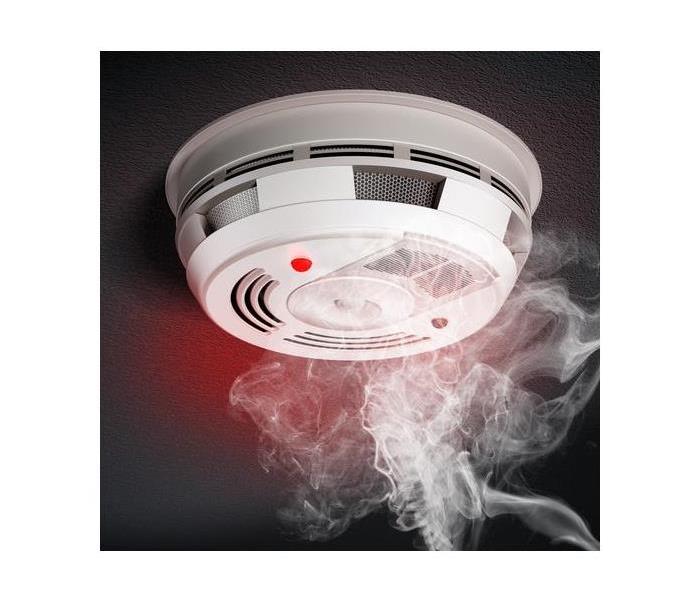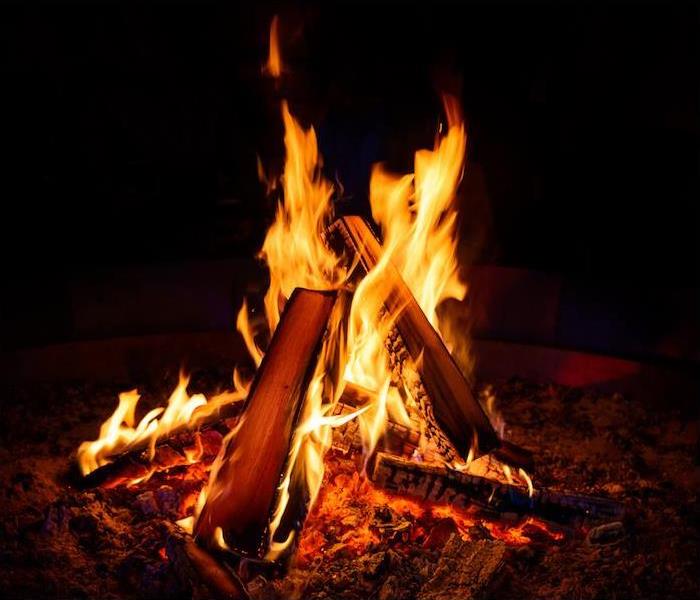Recent Fire Damage Posts
Tips for a Fire-Free Holiday Season | SERVPRO of Conway & Faulkner Counties
12/15/2024 (Permalink)
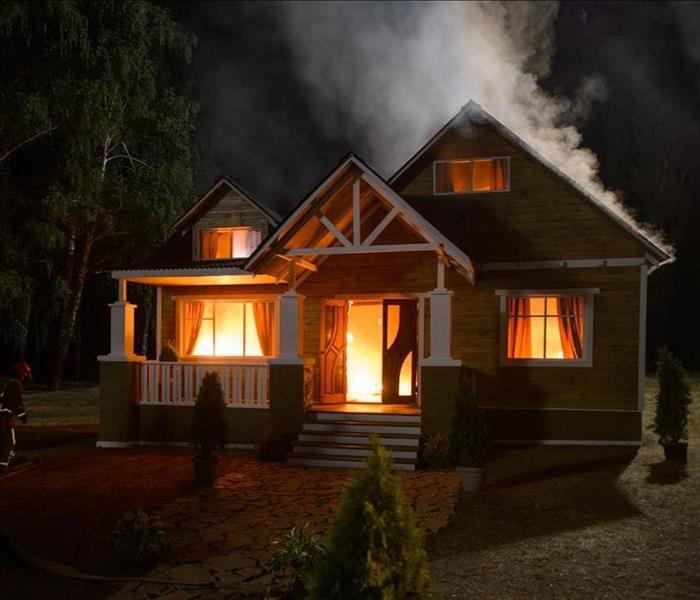 For immediate help following a house fire, call SERVPRO of Conway & Faulkner Counties.
For immediate help following a house fire, call SERVPRO of Conway & Faulkner Counties.
The holiday season is a time of joy and celebration, but it is also the season with the highest risk of house fires. With all the decorations and festivities, it is easy to overlook potential fire hazards.
However, taking proactive measures to prevent fires during the holiday season can help keep your family and home safe. Keep these tips from our SERVPRO® team in mind to help you avoid starting a house fire during the jolliest time of year.
Mind Your Tree
A beautifully decorated tree can be the focal point of your holiday decorations, but it can also be a significant fire hazard. To reduce the risk, choose a fresh tree with green needles that are difficult to pull out. A dried-out tree can catch fire more easily, so make sure to water your tree regularly. Keep your tree at least three feet away from any heat source, including fireplaces, radiators and candles.
If you have an artificial tree, check your lights and make sure there are no frayed cords or loose connections. Finally, turn off all lights before going to bed at night or set a timer so they automatically turn off after a certain period of time.
Practice Safe Kitchen Habits
Holiday cooking is a tradition for many families, but your famous recipe can quickly lead to disaster if you aren’t careful. The best way to reduce the risk is to stay in the kitchen while cooking. If you have to leave, turn off the oven or stove while you are away.
Also, keep anything flammable away from your heat source. Check your appliances before using them for any signs of wear like faulty knobs, loose connections or frayed cords that could lead to a serious fire risk. If you notice any damage, do not use the appliance(s).
Decorate Safely
Holiday decorations can add a festive touch to your home, but they can quickly catch fire if they are placed where they shouldn’t be. Choose flameless candles, which are safer than traditional candles because you don’t have to worry about blowing them out before leaving a room or before going to bed.
If you like to decorate your home with lights, be sure not to overload your outlets or misuse extension cords by pulling them into one another. If you have a fireplace, radiator or anything else that produces heat in your home, keep these areas free of flammable decorations.
Even hanging something too low on the mantle over your fireplace can be dangerous if your fire grows too large or too hot.
Call SERVPRO
In case of fire damage, SERVPRO of Conway & Faulkner Counties can help you recover faster so that you can get back to your holiday celebrations.
We are available 24/7 to respond to your call for help, and we will prioritize extracting water, cleaning up debris and restoring your home to its pre-fire condition. With our expertise and advanced equipment, we can help you get your life back on track so you can enjoy the rest of your holidays in peace.
House fires can be really destructive. Call SERVPRO of Conway & Faulkner Counties for a quick recovery.
Keep Your Thanksgiving Feast Fire-Free: Essential Safety Tips | SERVPRO of Conway & Faulkner Counties
11/25/2024 (Permalink)
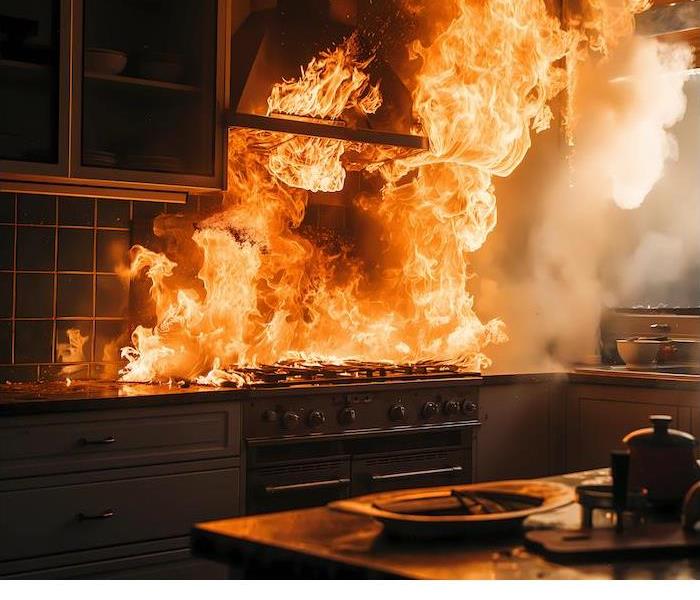 Enjoy a safe Thanksgiving! Follow these fire safety tips, and call SERVPRO for fire restoration help if needed.
Enjoy a safe Thanksgiving! Follow these fire safety tips, and call SERVPRO for fire restoration help if needed.
As Thanksgiving approaches, many of us look forward to gathering with loved ones around the dinner table. However, the kitchen can become a risky place if proper precautions aren’t taken. At SERVPRO of Conway & Faulkner Counties, we’re dedicated to ensuring your holiday celebrations are both joyous and safe. Here are some essential Thanksgiving fire safety tips, including how to deep fry a turkey without risking disaster.
Cooking Safety Starts in the KitchenThe kitchen is where Thanksgiving magic happens, but it can also be a hub for fire hazards. To maintain a safe cooking environment, keep all flammable items—like paper towels and dishcloths—away from the stove. Always stay close while cooking, especially when using oils or open flames, as leaving food unattended can lead to fires.
It’s also crucial to have a fire extinguisher nearby and ensure that everyone in your home knows how to use it. This proactive approach can make all the difference in preventing a Thanksgiving fire emergency.
Mastering the Art of Safe Deep FryingDeep frying a turkey is a popular way to achieve a crispy, delicious result, but it requires specific safety measures to avoid accidents. First, always perform this cooking method outdoors, ensuring it’s a safe distance away from your home and any overhanging branches.
Set the fryer on a flat, stable surface to prevent tipping. Before heating the oil, double-check that your turkey is completely thawed and dry—introducing moisture into hot oil can lead to dangerous splatter. Keep a close eye on the oil temperature and never leave the fryer unattended. If a fire occurs, remember that water will only make it worse; use a fire extinguisher rated for grease fires instead.
Wrapping Up Safely After the FeastOnce you’ve savored your Thanksgiving meal, keeping fire safety in mind remains essential. Make sure all cooking appliances are turned off and avoid leaving any leftovers out for extended periods. Proper disposal of cooking oil is vital, as used oil can pose a fire risk if not handled correctly. After the festivities, resist the urge to leave hot pots or pans unattended; let them cool completely before cleaning up. Keeping safety in mind ensures that your Thanksgiving celebration doesn’t end in a fire emergency.
This Thanksgiving, make safety a priority in the kitchen. By following these essential fire safety tips and learning how to deep fry a turkey safely, you can enjoy your holiday without the worry of accidents.
If you experience a fire in your home, remember that SERVPRO of Conway & Faulkner Counties is ready to assist with fire damage restoration and cleanup. Here’s to a safe and happy Thanksgiving! For more information on fire safety and our services, contact us today.
Summer Fun and Fire Safety: Keeping Your Family Safe | SERVPRO of Conway & Faulkner Counties
8/2/2024 (Permalink)
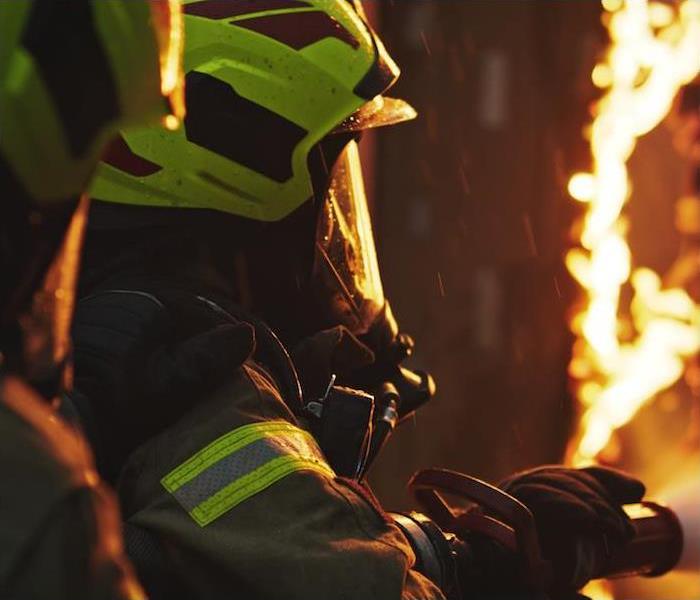 SERVPRO of Conway & Faulkner Counties is ready to help you have a fire-safe summer season with these helpful tips!
SERVPRO of Conway & Faulkner Counties is ready to help you have a fire-safe summer season with these helpful tips!
Summer is a time for outdoor activities, barbecues, and family gatherings. However, amidst the fun and relaxation, it’s crucial to prioritize fire safety to protect your loved ones and property.
Here are some essential tips to ensure a safe and enjoyable summer season.
1. Grilling SafetyOne of the highlights of summer is firing up the grill for delicious outdoor meals. However, grills pose significant fire hazards if not used correctly. Always place your grill in an open, well-ventilated area away from structures and overhanging branches.
Keep children and pets at a safe distance to prevent accidental burns. Never leave the grill unattended, and ensure it’s thoroughly cleaned to prevent grease buildup, which can ignite and cause a fire. By following these precautions, you can enjoy your barbecue while reducing the risk of fire hazards.
2. Campfire AwarenessSummer camping trips often include cozy campfires under the stars. While campfires are enjoyable, they require careful management. Choose a designated fire pit or ring in a cleared area away from tents, dry grass, and overhanging branches. Always keep a bucket of water or a fire extinguisher nearby for quick extinguishment if needed.
Never leave a campfire unattended, and ensure it is fully extinguished before leaving or going to sleep. By practicing responsible campfire etiquette, you can prevent wildfires and ensure a safe outdoor experience for everyone.
3. Electrical and Firework SafetySummer festivities may also include fireworks and decorative lighting, both of which require careful attention to fire safety. When using fireworks, follow local laws and regulations, and always have a bucket of water or hose nearby. Never attempt to relight malfunctioning fireworks, and dispose of used fireworks by soaking them in water before disposal.
Similarly, decorative lighting such as string lights should be inspected for frayed wires or damage before use to prevent electrical fires. Avoid overloading electrical outlets and use outdoor-rated extension cords when necessary. By practicing caution with fireworks and electrical devices, you can avoid potential fire hazards and enjoy a safe summer celebration.
Staying Safe in ConwayAs you enjoy the warmth and activities of summer, remember that fire safety should always be a top priority. Whether grilling with family, sitting around a campfire, or celebrating with fireworks, taking preventive measures can protect lives and property.
By following these guidelines, you can ensure a safe and enjoyable summer season for everyone. Let’s make this summer memorable for all the right reasons—fun, laughter, and most importantly, safety.
Contact SERVPRO of Conway & Faulkner Counties today to learn more about fire safety tips and how we can help in case of fire damage. Stay safe and enjoy your summer responsibly!
Assessing Wildfire Risk To Prioritize Your Safety | SERVPRO of Conway & Faulkner Counties
7/2/2024 (Permalink)
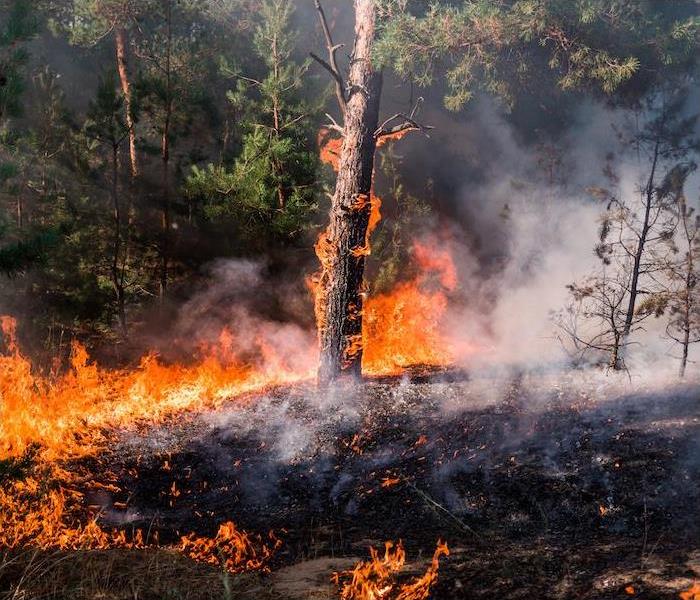 SERVPRO of Conway & Faulkner Counties is Here to Help® after wildfires affect your home or business.
SERVPRO of Conway & Faulkner Counties is Here to Help® after wildfires affect your home or business.
Living in the scenic region of Conway & Faulkner Counties comes with its share of natural beauty and occasional risks, including the threat of wildfires. As residents of this picturesque area, it’s essential to be prepared for the possibility of wildfires and take proactive steps to protect our homes and communities.
##Understanding the Risk Level Understanding Local Conditions: Familiarize yourself with the wildfire risk in Conway & Faulkner Counties. Factors such as weather patterns, vegetation types, and proximity to wooded areas can all influence the likelihood and severity of wildfires in the area. Stay informed about wildfire forecasts and advisories issued by local authorities to help you gauge the level of risk.
Identifying Vulnerabilities: Assess your property for potential vulnerabilities that could increase the risk of wildfire damage. Pay close attention to areas with dense vegetation, such as wooded lots or overgrown landscaping, as these areas are more susceptible to ignition. Additionally, consider the proximity of your home to sources of ignition, such as power lines or neighboring properties.
Creating a Fire-Safe Zone: Establish a defensible space around your property by clearing vegetation and debris from the immediate vicinity of your home. Remove dead vegetation, dry leaves, and other flammable materials from your yard to create a buffer zone that helps prevent fires from spreading. Trim trees and shrubs, keeping branches at least 15 feet away from structures, to reduce the risk of fire spreading to your home.
Implementing Fire-Safe PracticesMaintaining Fire-Resistant Landscaping: Choose fire-resistant plants and materials for your landscaping to help minimize the risk of ignition. Select plants with high moisture content and avoid using highly flammable mulches, such as pine straw, near structures. Consider incorporating hardscaping features such as gravel pathways and rock gardens, which can act as fire breaks to help protect your property.
Securing Your Home: Take proactive measures to protect your home from ember intrusion during a wildfire. Seal gaps and openings around windows, doors, and vents to prevent embers from entering your home and igniting combustible materials. Install ember-resistant vent covers and consider upgrading to fire-resistant roofing materials to further enhance your home’s fire resistance.
Preparing for Evacuation: Develop a comprehensive evacuation plan for your family and pets in case of a wildfire evacuation order. Identify multiple evacuation routes and establish a designated meeting point outside of the evacuation zone. Pack essential items such as medications, important documents, and emergency supplies in a “go bag” that you can easily grab and take with you if evacuation becomes necessary.
Partnering with SERVPRO of Conway & Faulkner CountiesPreparing your property for the threat of wildfires is essential for safeguarding your home and community. At SERVPRO of Conway & Faulkner Counties, we understand the unique challenges posed by wildfires in our area and are here to help you protect your property. Contact us today for expert advice on wildfire preparedness and professional fire damage restoration services. Together, we can take proactive steps to mitigate the risk of wildfire damage and keep our communities safe.
Dealing with fire damage? Call SERVPRO of Conway & Faulkner Counties for a quick restoration.
Grilling Safety Tips for the Summer Time in Conway | SERVPRO of Conway & Faulkner Counties
6/3/2024 (Permalink)
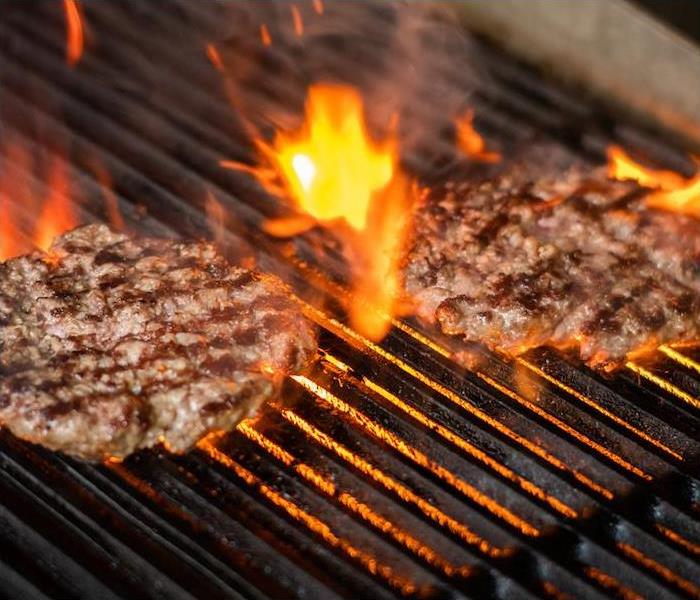 Gather around the grill, but don't forget about fire safety! Follow these tips from SERVPRO of Conway & Faulkner Counties to ensure a fun, safe night.
Gather around the grill, but don't forget about fire safety! Follow these tips from SERVPRO of Conway & Faulkner Counties to ensure a fun, safe night.
Hey there, Conway! With those hot and dry summer months upon us, there’s nothing quite like firing up the grill for some delicious BBQ.
But before you get your grill on, let’s talk about grilling safety. Here are some tips from SERVPRO of Conway & Faulkner Counties to ensure your BBQ stays safe and enjoyable all season long.
Choosing the Right LocationFirst things first, let’s talk about where to set up your grill. When it’s hot and dry outside, it’s essential to choose a safe location away from any flammable materials. Look for a flat, level surface that’s at least 10 feet away from your house, deck railings, and any trees or bushes.
Avoid grilling on a windy day, as gusts of wind can easily carry embers and sparks, increasing the risk of a fire. And remember, never grill indoors or in enclosed spaces, as this can lead to carbon monoxide poisoning.
Proper Grill MaintenanceNow that you’ve found the perfect spot for your grill, let’s talk maintenance. Proper grill maintenance is crucial for safety, especially during the hot and dry months. Start by checking your grill for any signs of wear and tear, such as rusted or corroded parts.
Make sure all the connections are secure and that there are no gas leaks. If you’re using a charcoal grill, be sure to clean out any ash buildup before lighting the coals. For gas grills, check the propane tank for leaks and ensure the hoses are in good condition.
Safe Grilling PracticesOnce your grill is set up and ready to go, you need to be sure to practice proper grilling safety. Never leave your grill unattended while it’s in use. It only takes a few seconds for a fire to start, so be sure to stay nearby and keep an eye on your grill at all times.
Keep a fire extinguisher, baking soda, or a bucket of sand nearby in case of a grease fire. Never use water to extinguish a grease fire, as it can cause the flames to spread.
Use long-handled grilling tools to keep a safe distance from the flames and prevent burns. And always keep flammable items like paper towels, dishcloths, and plastic utensils away from the grill. By following these grilling safety tips, you can enjoy delicious BBQ without worrying about accidents or fires.
If you ever find yourself in need of fire damage restoration services, SERVPRO of Conway & Faulkner Counties is Here to Help®.
Tips for a Safe and Toasty Warm Winter | SERVPRO of Conway & Faulkner Counties
1/16/2024 (Permalink)
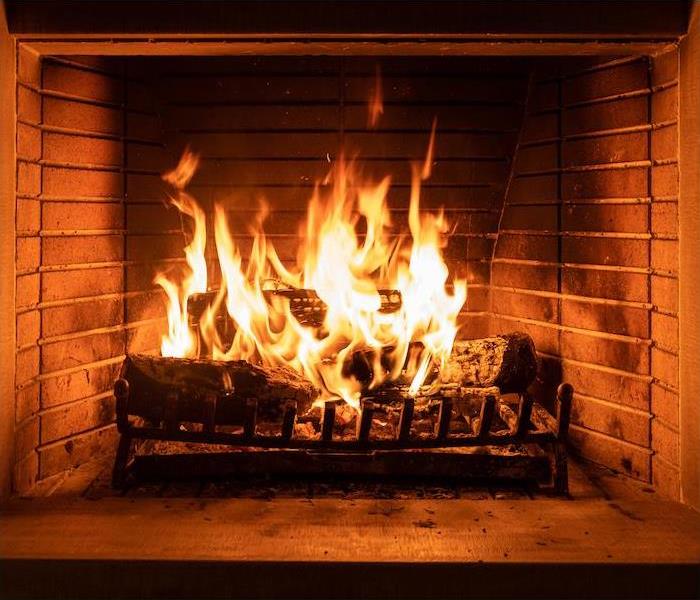 Fire safety is a top priority for us at SERVPRO of Conway & Faulkner Counties this winter. Keep your home safe with these helpful tips!
Fire safety is a top priority for us at SERVPRO of Conway & Faulkner Counties this winter. Keep your home safe with these helpful tips!
Now that the holidays are over and a new year has begun, we all settle in to ride out the doldrums of winter together. These chilly temperatures and unfavorable weather can have all of us running to the warmth and safety of our homes much more often.
Unfortunately, the number of house fires drastically increases in the winter as we all turn on space heaters or stoke our fireplaces. Our team explains some easy ways to reduce your fire risk without sacrificing your comfort below.
Prepping Your FiresWe can all appreciate how nice a warm fire can feel on a cold winter’s night, but fireplaces can be really dangerous if not cared for properly.
First, you need to be cleaning out leftover ash before each new fire, and you should also take the time to thoroughly scrub your chimney walls to remove creosote buildup. Consider hiring a professional to come out and perform a thorough inspection of your chimney every year to look for cracks or aging issues.
If you keep flammable materials on your mantle, remove them before starting a fire and check to make sure your smoke detectors are in good working order. If your fireplace is gas or electric, take the time to check the gas or electrical lines before flipping your switch on. A single leak or loose connection can be dangerous or even deadly.
Setting Up Heaters for SuccessWho doesn’t love having a toasty space heater at their feet while they are working or nearby while reading on the couch? However, space heaters can also be dangerous if they aren’t used properly. In fact, around 1,700 house fires are started by faulty space heaters or misuse.
The key to safe space heater use is to set it up in a fire-safe location. Choose a spot in your home that is flat, level and nonflammable, avoiding carpets or shag rugs. Keep the cord lying flat and consider taping it down to avoid tripping hazards.
This tip may surprise you, but your space heater should have a buffer of at least three feet of anything around it. This is crucial in case it tips over or gets knocked over. Try to keep pets and kids out of the area as much as possible.
Tips for Safety FeaturesIt is important to remember that not all space heaters are created equally, so don’t just buy the first one you see or the one that is on sale. Do your research to make sure you are choosing a safe heater.
Check their website to ensure that they have passed all of their safety certifications, and read reviews of the heater you are researching to check what actual users have to say about it. In addition, certain safety features can help ensure it is a good purchase. A safety shutoff feature can help be a great backup if you have a hard time remembering to turn off your heater!
Lastly, be sure the heater cord is well-made and long enough for your needs. A length of at least six feet can help ensure you can set your heater up in a fire-safe location without sacrificing your comfort in the process.
Stay safe, stay warm and stay fire-free out there, folks! We hope you have a great rest of your winter season, but remember that we are always here if you suffer from any kind of fire damage. We will put your home back together quickly and with the confidence you deserve.
A quick fire damage restoration is just a phone call away. Call SERVPRO® for immediate assistance.
Baking Up Your Holiday Treats in a Fire-Safe Way | SERVPRO of Conway & Faulkner Counties
11/17/2023 (Permalink)
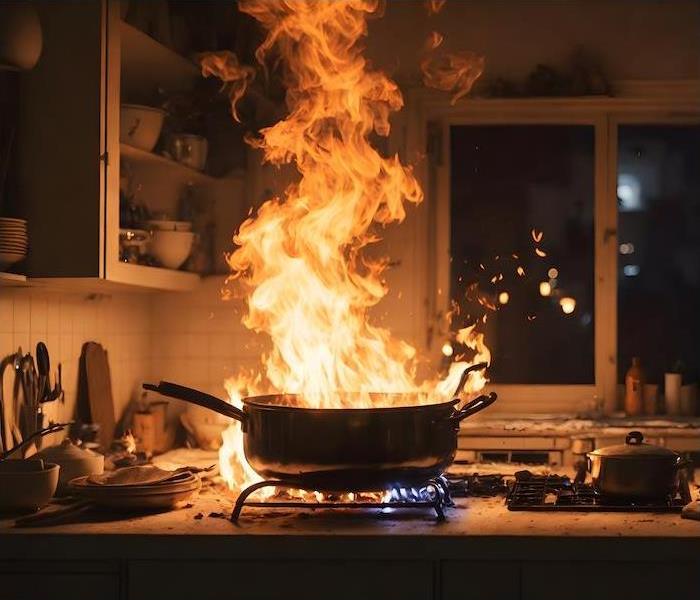 Fire damage in your home? Not for long with SERVPRO of Conway & Faulkner Counties on the case!
Fire damage in your home? Not for long with SERVPRO of Conway & Faulkner Counties on the case!
The jolliest time of year has arrived, and we are ready to celebrate the holidays right alongside you. No matter what holidays you observe or how you celebrate, we would bet there will be an abundance of delicious homecooked meals and treats for all to enjoy.
Whether you always bring your family-famous green bean casserole or your sugar cookies are the first to go on the platter, you will be spending more time in the kitchen this season preparing for your holiday parties.
House fires increase at this time of year, particularly those that start in the kitchen. By incorporating these fire-safe practices, you can cook with confidence without the worry of starting an out-of-control blaze.
Space PreparationGetting your space ready is the key to success! Removing clutter from around your counters and floor can take away tripping hazards, and you should keep your little ones and pets out of this area while the stove or oven is on.
You also need to limit the amount of flammable materials near your burners. Take away wooden utensils, pot holders, oven mitts and holiday decorations, and store them in a safe place so they can’t accidentally catch on fire.
In addition to removing flammable hazards around your kitchen, you also need to address your clothing! Loose apron strings, holiday outfits and long sleeves can also become fire hazards and can create a really dangerous situation for you. Be mindful about your outfit and keep those sleeves rolled up.
Watch Food CarefullyIf you are in charge of baking, boiling, grilling or frying, stay close by the kitchen. All forms of cooking can be dangerous, so being near your stove or oven can help you control a situation before it gets out of hand.
Some families love the tradition of deep-frying a turkey, which requires extra precautions and safety measures. Choose one person who will man the fryer and control the oil. Use a flat, nonflammable surface that is far away from any overhangs or outbuildings. Check the package of your turkey, and make sure to pull it out in time so that the meat is completely thawed by the time it goes into the fryer.
Check on Your Alarms and ExtinguishersPreventing a situation before it starts is always ideal, but sometimes it is just not possible. This is why having your alert systems and extinguishers ready to go is vital! Check the batteries in your smoke alarms every month, and replace them as needed.
You also should be sure you have at least one fire extinguisher in your home. Ideally it should be kept close to or inside your kitchen for emergencies. Being able to access it quickly can help you knock down a few flames so you can avoid serious damage.
We hope you have a safe and relaxing holiday season, but remember that we are always here to help you overcome any fire damage that you do suffer. We will clean, sanitize and rebuild your kitchen so you can get back to your festive holiday plans ahead.
House fires can happen in the blink of an eye. Contact us for a quick restoration day or night!
Basic Grill Safety For Your Backyard BBQ | SERVPRO of Conway & Faulkner Counties
9/19/2023 (Permalink)
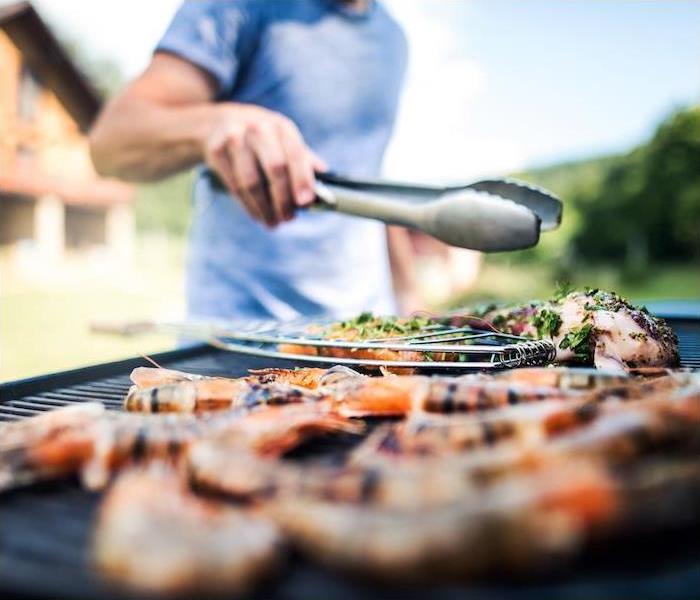 Have you had a barbeque gone wrong? Call SERVPRO of Conway & Faulkner Counties to get your space back in shape.
Have you had a barbeque gone wrong? Call SERVPRO of Conway & Faulkner Counties to get your space back in shape.
If the summer season is your favorite time of year in Conway, you are not alone! We love the warm sunny days and extra time spent with friends and family just like you do. One of our favorite summer activities is to host BBQs and grill up some burgers and hot dogs.
While grilling may be more common at this time of year, it also brings about the rise in grill fires, which sometimes lead to house fires! In order to reduce your risk of starting an accidental fire while you are grilling, you have to prepare your space and be responsible for the flames.
Read on as our SERVPRO® of Conway & Faulkner Counties team explains some easy ways to stay safe and fire-free while you are whipping up your famous BBQ ribs or grilled chicken.
Setting Up for SuccessThe first thing you need to ensure is that your work space is safe and set up outside. You may be thinking that is obvious, but this also includes avoiding your garage and any roof overhangs completely. A grill that can’t vent properly is a health hazard and if it is underneath anything combustible, the heat could start your house on fire.
A good place to set up your grilling spot is a concrete pad or the center of your driveway if it is level. A 10-foot radius from your siding or wooden railings of your deck add an extra layer of protection. Aim to keep pets and kids out of this barrier as well.
Next up, it is time to inspect your specific grill. If you have a charcoal grill, check the drum for any dents or deformities and clean out any ash from the tray catch. If you have a propane grill, be sure that all gas lines are secure and your propane tank isn’t dented or cracked. A leaky tank or gas line is a huge safety concern and can also lead to a dangerous fire situation.
Manning the GrillNow that you are ready to grill, stay there and grill! Don’t leave your post while you have food on the grill and the flames are hot. Keep a water source like your hose nearby just in case, and consider having a spray bottle on hand to knock down small sparks or a wandering flame.
When you are done grilling and ready to shut everything down, hand off the plate of food and start shutting off burners and closing propane tanks, or scatter the coals and close the vents to cut off the oxygen supply. Once cooled, remove the ashes and put them in a metal can nearby. Check on your grill one more time before going to bed to ensure everything is off and your grill is cool to the touch.
We hope you enjoy the rest of the summer season here in the Conway area! If you do wind up suffering fire damage, remember that SERVPRO of Conway & Faulkner Counties is always here for you.
Don’t let fire damage linger in your home. Call us at SERVPRO of Conway & Faulkner Counties for a fast restoration.
Tips for Safe Fall Bonfires at Home | SERVPRO of Conway & Faulkner Counties
9/19/2023 (Permalink)
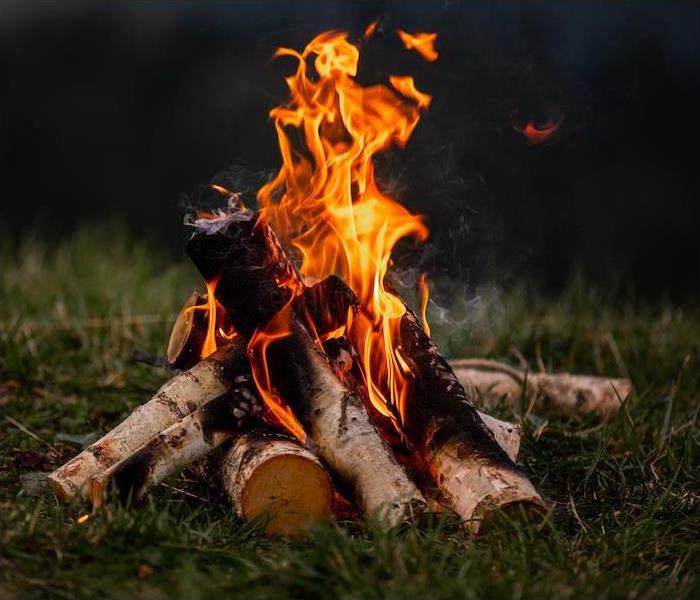 Bonfire season is upon us! SERVPRO of Conway & Faulkner Counties has your back with these helpful fire safety tips.
Bonfire season is upon us! SERVPRO of Conway & Faulkner Counties has your back with these helpful fire safety tips.
While the temperatures outside may not reflect it, the fall season is right around the corner! We are so excited to welcome in a new season and (hopefully) get a break from these crazy hot temperatures. One way that many people in our community enjoy the changing seasons is by hanging out by a bonfire.
Fall bonfires are a great way to relax and spend time with your loved ones, but they can also lead to extensive fire damage if you aren’t careful.
Our SERVPRO® of Conway & Faulkner Counties team explains more below about fall fire safety and what to do to keep your fire controlled and enjoyable for all.
Starting Your Fire the Safe WayDo choose a safe and level location for your pit. Portable pits can be moved around to find a flat, nonflammable surface, while permanent pits should be cleared of any nearby brush or logs. You should also make sure any trees are trimmed that are hanging over your pit.
Do keep a source of water ready to use at a moment’s notice. Buckets of water or your garden hose are both reliable ways to extinguish errant flames quickly. If you are too far away from a water source, be sure to keep a shovel nearby if you need to pile dirt or sand on top of the flames in an instant.
Do respect the weather and any local burn bans. High winds or dry conditions can make even the smallest fire dangerous, so choose another day if the conditions are less than ideal. Checking with local authorities is always recommended because burn bans can change by the day.
Maintaining a Safe FireDon’t use any gas or lighter fluid on your fire at any point. Flammable substances can light a quick blaze, yes, but they are really unpredictable and can lead to a rapidly spreading fire or one that becomes too large to control.
Don’t let kids or pets play near the flames. In addition to accidents and severe burns, curious children can easily pick up burning sticks and cause your fire to spread beyond your pit.
Don’t let your fire get too large or out of control. It can be fun to feed your fire and watch things burn, but large fires are much harder to control and extinguish fast, so keep it small to keep it safe.
Don’t go inside until a responsible adult has extinguished the flames and embers. Pouring water over everything is vital until all of the logs and ashes are cold to the touch.
Wildfire SafetyWildfires can start in any manner of ways and can lead to widespread destruction and even death in serious situations. While nature can be responsible for some of these fires, most wildfires are human-caused. You can directly decrease your risk of starting a wildfire with every responsible fire safety decision you make. Doing all of these tasks while you enjoy your bonfire will help keep our community safe.
Fire can be unpredictable, and we know that accidents can occur at any point. Call us right away if your home has been damaged by smoke or flames.
Fire can cause a lot of damage in a short amount of time. Contact us day or night for immediate assistance.
Understanding Our Fire Damage Restoration Process | SERVPRO of Conway & Faulkner Counties
6/16/2023 (Permalink)
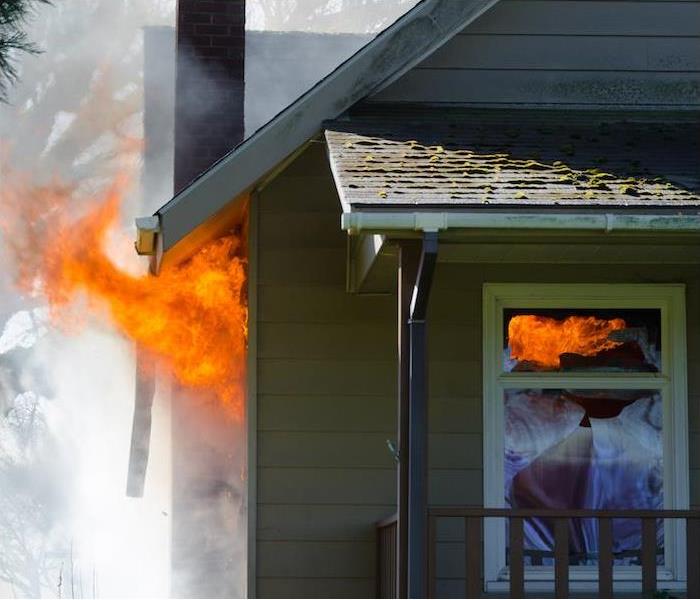 House fires are scary events. Call SERVPRO of Conway and Faulkner Counties to help get you back in action.
House fires are scary events. Call SERVPRO of Conway and Faulkner Counties to help get you back in action.
Imagine this—it’s the end of a busy week and you and your family are looking forward to going out for dinner together tonight. You get all the kids ready, get yourself ready and just barely remember to switch over your laundry into the dryer before you leave. You hit start, hop in the car and head to dinner.
You are settled into a booth with your family, only to receive the phone call no one ever wants to get: Your house is on fire. Thankfully, our local fire department can help put out the flames and control the situation, but that doesn’t mean you won’t have an overwhelming task of home repairs ahead of you.
That’s where SERVPRO of Conway & Faulkner Counties comes in. We can handle your fire damage restoration process from start to finish, and we work hard to make sure your experience is as smooth as it can be during this time. Check out our restoration process below to learn how we can help you.
The Initial Contact
- We are a part of your team from the minute you call us. We will ask questions about the fire damage and your specific situation so we can start to gather the right tools and equipment.
- We arrive and inspect the damage firsthand. We inspect and test the damage site as well as other rooms to understand the level of fire, smoke and soot damage.
- Our team then secures the rest of your home from further damage, which can include boarding up windows and walls or placing tarps on exposed sections of your roof.
The Removal Process
- Many fire-damaged homes also have water damage due to the water used to extinguish the fire. We can bring in our drying equipment and humidifiers at this time.
- At the same time, we start to remove damaged debris and the residual smoke and soot from your property. Our deodorizers can ensure a complete odor removal throughout your home.
Restoration Time
- Once the debris and soot have been removed, it’s time to start putting your home back together. We start with a deep-clean and sanitization of your space.
- Then we get to start on your repairs! This can include anything from replacing drywall and painting to restoring entire rooms or sections of your home.
We know that suffering a house fire is an overwhelming and scary experience, so we will handle everything from your restoration project to working with your insurance company to ensure a smooth claims process. SERVPRO of Conway & Faulkner Counties is here 24/7 for you.
Suffered a house fire? Our SERVPRO® team is here to help.
Teaching Your Kids About Fire Safety | SERVPRO of Conway & Faulkner Counties
6/14/2023 (Permalink)
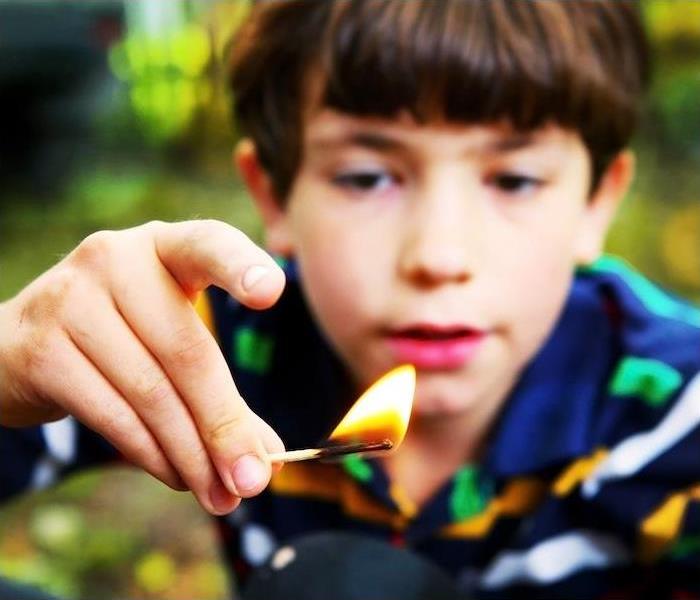 SERVPRO of Conway & Faulkner Counties is here for you and your family if you experience a fire in your home or business.
SERVPRO of Conway & Faulkner Counties is here for you and your family if you experience a fire in your home or business.
f you have children, you know how much work it is to keep them safe on a daily basis! The world is full of unknowns and things are often out of your complete control, but you do your best to teach them about personal safety while also fostering independence. This can sometimes be tricky with sensitive topics without scaring your children with the facts.
Fire safety is one of those topics that if you introduce it wrong, it can cause your children unnecessary stress and anxiety. By introducing fire safety in a fun or encouraging way, you can increase your child’s likelihood of responding quickly and accurately to a fire emergency.
SERVPRO of Conway & Faulkner Counties explains how to introduce some of these concepts below, so read on to get some ideas for your own children.
Discovering Where Fire StartsFires can start in many areas of your home, and each instance carries its own level of risk. Start by explaining how fire starts and what is needed in order for a fire to spread, and then let your children walk around your home to try and identify every space that could start a fire. Lead them into the kitchen, utility room and even the backyard by the grill or fire pit.
Show them the matches and lighters that you use so that your children are familiar with them. Once you explain that they are not toys and should only ever be used by adults, your children will be more likely to leave them alone. A single match and a curious child are never a good mix.
Authority FiguresSeeing a firefighter in his or her suit and heavy gear can be an overwhelming or even scary experience, so don’t let this first interaction happen during a true fire emergency. Try to expose your kids to pictures, videos and books about firefighters. You should also attempt to go to any local meet-and-greet events to see our local fire crews in person.
If your child knows what to expect, it can help him or her understand that these people are just there to help and to trust them. You also need to ensure your children are comfortable calling for help.
To do this, put them in their rooms and have them call out their name as loud as they can! Once you can hear them, tell them to army crawl out of their room and toward the front door.
Forming Your Family Escape PlanAll homes should have a robust emergency exit plan. If you don’t already have one, this is the perfect chance to make it a fun game for your kids. Let them go into each room and find all of the ways out, and have them write down their findings. Once you have your list, see who can make it out of your home the fastest!
This is also the perfect time to discuss the use of windows and window safety. While knowing how to open the windows is important in an actual emergency, be sure that your children know that windows are always a last resort and should never be played with.
Once you are done, put it all together and practice getting out of your home! Choose an external meeting location and practice your plan all the way through at least twice a year.
Fires can cause widespread damage. Call us for a thorough and efficient restoration.
Understanding Our Fire Damage Restoration Process | SERVPRO® of Conway & Faulkner Counties
5/18/2023 (Permalink)
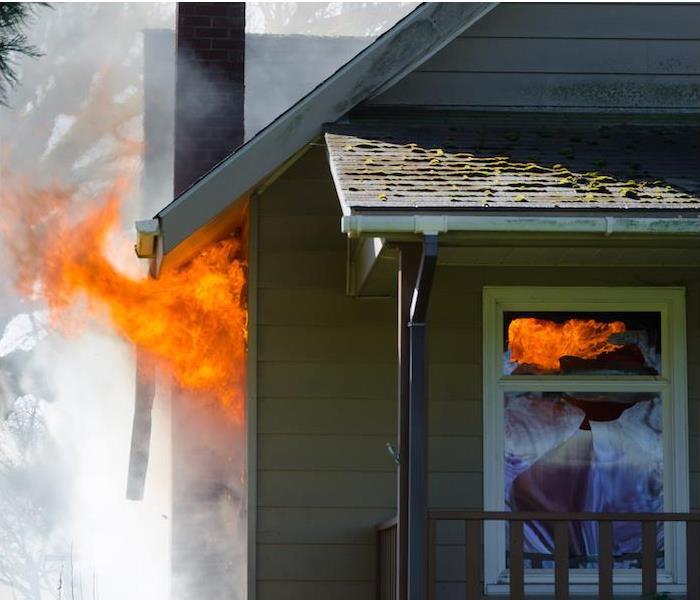 Experiencing a house fire is a scary experience. SERVPRO of Sumter is here to help you through whatever disaster may strike.
Experiencing a house fire is a scary experience. SERVPRO of Sumter is here to help you through whatever disaster may strike.
Imagine this—it’s the end of a busy week and you and your family are looking forward to going out for dinner together tonight. You get all the kids ready, get yourself ready and just barely remember to switch over your laundry into the dryer before you leave. You hit start, hop in the car and head to dinner.
You are settled into a booth with your family, only to receive the phone call no one ever wants to get: Your house is on fire. Thankfully, our local fire department can help put out the flames and control the situation, but that doesn’t mean you won’t have an overwhelming task of home repairs ahead of you.
That’s where SERVPRO of Conway & Faulkner Counties comes in. We can handle your fire damage restoration process from start to finish, and we work hard to make sure your experience is as smooth as it can be during this time. Check out our restoration process below to learn how we can help you.
The Initial Contact
- We are a part of your team from the minute you call us. We will ask questions about the fire damage and your specific situation so we can start to gather the right tools and equipment.
- We arrive and inspect the damage firsthand. We inspect and test the damage site as well as other rooms to understand the level of fire, smoke and soot damage.
- Our team then secures the rest of your home from further damage, which can include boarding up windows and walls or placing tarps on exposed sections of your roof.
The Removal Process
- Many fire-damaged homes also have water damage due to the water used to extinguish the fire. We can bring in our drying equipment and humidifiers at this time.
- At the same time, we start to remove damaged debris and the residual smoke and soot from your property. Our deodorizers can ensure a complete odor removal throughout your home.
Restoration Time
- Once the debris and soot have been removed, it’s time to start putting your home back together. We start with a deep-clean and sanitization of your space.
- Then we get to start on your repairs! This can include anything from replacing drywall and painting to restoring entire rooms or sections of your home.
We know that suffering a house fire is an overwhelming and scary experience, so we will handle everything from your restoration project to working with your insurance company to ensure a smooth claims process. SERVPRO of Conway & Faulkner Counties is here 24/7 for you.
Suffered a house fire? Our SERVPRO team is here to help.
Is Your Home Ready for a Lightning Strike? | SERVPRO® of Conway & Faulkner Counties
10/1/2022 (Permalink)
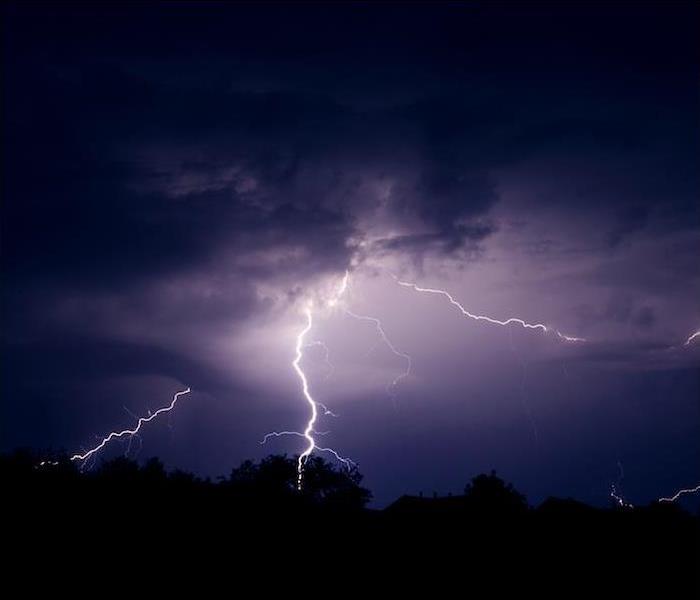 If you are dealing with smoke or fire damage from a recent fire, call SERVPRO of Conway & Faulkner Counties to learn about a restoration solution for
If you are dealing with smoke or fire damage from a recent fire, call SERVPRO of Conway & Faulkner Counties to learn about a restoration solution for
Fire safety is most commonly focused on preventing fires inside the home. But what happens when the fire originates from a source outside of our control? Lightning strike fires can be incredibly destructive if they are not caught and extinguished right away.
Having your home hit by a lightning bolt actually is more common than you might assume. In 2020 alone, 70,000 homes were damaged by lightning or the fire after the strike. If this happens to you, it is important to know what to do!
Lightning CreationLightning is a reaction of a large electric current inside a thunderstorm. When the current becomes overly charged, a giant spark is produced and travels to the ground.
Wherever lightning decides to hit, there is risk of a fire or widespread damage.
Your Home’s RiskIf your home gets hit by lightning, it is really important to do a thorough check of every level of your house to catch any fires, as one may have started inside a wall or up in the eaves of your house.
Since Mother Nature is unpredictable, it is impossible to know exactly when a lightning strike might hit your home, but you can take some preventive measures.
Add a lightning rod to your roof to help absorb some of the impact of that electrical current. These metal poles are great for reducing your overall level of damage.
Next, you can add surge protectors around the outlets in your home to protect your electronics and to prevent an overall electrical disaster.
Lighting in the AreaUnfortunately, even if you escape a thunderstorm without your home experiencing a lightning strike, you can still be the victim of a lightning fire! All it takes is a strike in a dry field or on a house where no one is home for a fire to get out of control quickly. If that happens, a wildfire may begin.
Address your yard from time to time, and clear it of dead grass or leaves often. You should also look into how you choose to landscape your yard and incorporate some defensible space zones to provide your home with a buffer.
The most important thing to remember is that if you do discover a fire after a lightning strike, get out of your home and call 911. Staying safe is crucial!
After the fire has been extinguished by the professionals, call us at SERVPRO of Conway & Faulkner Counties. We are ready to respond to any type of fire disaster and we will help you fully recover.
Have you experienced smoke or fire damage in your home? Call us today to get the restoration finished fast.
Responsible Recreational Fire Use | SERVPRO® of Conway & Faulkner Counties
8/4/2022 (Permalink)
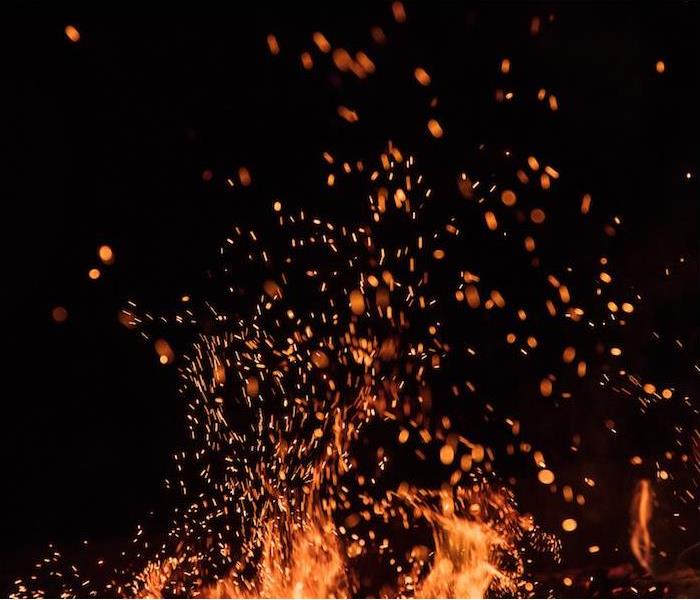 If you have experienced fire or smoke damage, contact SERVPRO of Conway & Faulkner Counties.
If you have experienced fire or smoke damage, contact SERVPRO of Conway & Faulkner Counties.
Spending time in your backyard is a staple for the summertime season. Chocolatey s’mores around the bonfire or grilling up your favorite hot dogs with family or friends are wonderful memories to make year after year.
In order to enjoy these fun activities, fire is a necessity! But whether we are lighting a grill or stoking a bonfire, any time there is fire present, there is a higher risk of danger. The National Park Service believes that the majority of wildfires are caused by humans.
Knowing that our grills and bonfires heighten the risk of sparking a wildfire can feel frightening or overwhelming, but it doesn’t have to. With some simple safety measures incorporated into your daily lives, you can continue to roast marshmallows, throw fresh corn on the grill or dispose of your yard waste.
Grills and BonfiresGrills, campfires, fireworks and portable fire pits are the most common culprits when it comes to starting an unintended fire. In fact, grills start 8,800 home fires.
Fires from grills are mostly started due to user error and neglect, so it is very important to always have someone responsible for the flames. It is also a good idea to check the gas lines and propane tank often to look for leaks or cracks.
If your family frequently builds bonfires, matches or lighters should be the method of lighting your fire. Once your flames are established, stick to only approved firewood and keep the lid on your gas can. Adding gas to a fire is one of the quickest ways to find yourself with an out of control blaze.
Portable fire pits are another great alternative to enjoy the feel of a campfire without having to dig a pit in your yard. However, they carry similar risks and should never be placed on a wooden deck or below any overhangs.
You should always have a way to extinguish the flames quickly if you need to. A shovel and a bucket of water or a hose can help put out a fire and control the damage.
Even though Independence Day has passed for the year, if you are planning to light fireworks for any other celebration this summer, make sure you know your specific city’s requirements for fireworks. Even though fireworks are legal in Arkansas, some cities allow certain kinds while others do not.
Additional Fire RisksIf you live on land that has a lot of leafy trees or pines, the leaf drop in the fall can be overwhelming! Sometimes it is necessary to burn off this debris in order to stay on top of it.
Before beginning any yard project, make sure you understand the local burn bans and the current fire risks for our counties. This handy website is updates in real-time and will change colors based on which counties are at risk.
If we are in a low risk time period, do one final check on the current weather conditions before proceeding. Any day that is excessively windy or particularly dry should be avoided. Skip the flames and choose another activity until the conditions improve.
Keeping your yard clear of excess debris and dead grasses actually helps minimize the risk of adding fuel to a potential wildfire. Understanding what is able to be burned in your backyard will also help keep your risk low.
If you have a gas can or two in your garage, your risk of fire is increased if they are not stored properly. Keep them out of reach of children and only store gasoline in approved containers.
Gas should also not be used for anything other than fuel. While it can be very tempting to use it as a fire accelerant, your fire can quickly get out of hand.
If you do find yourself with fire or smoke damage, we are here to help at SERVPRO of Conway & Faulkner Counties. Our trained teams are ready to tackle the damages, and we will work hard to get you back into your newly restored home as quickly as possible.
Burn safely outdoors. And save some chocolate for us! If you have experienced fire or smoke damage, contact us today to get restoration started faster.
Common Causes of Fires and Tips To Prevent Them
4/19/2022 (Permalink)
Here are some common causes of fires that you should know and some tips that can help prevent a fire at your home.
Cooking
- Remember to not leave the kitchen unattended while cooking.
- Turn off burners when finished.Have a fire extinguisher near the kitchen.
Smoking
- Never lay down or fall asleep while smoking
- Smoke outside to avoid falling asleep, putting a cigarette down.
Candles
- Never leave a candle unattended
- Make sure that the candle is not close to any items.
These are just a few tips in order to prevent fires. Change your batteries in your smoke detectors the same time each year so you don’t forget to do it and check them periodically to make sure they are working correctly. It is also a good idea to have a plan for you and your family if there ever was a fire and to have practice drills so your family members know what to do in the event of a fire in your home. SERVPRO of Conway & Faulkner Counties is here to answer any questions if you have had a fire at your home. We are available for emergency service 24 hours 7 days a week.
Fire Can’t Start Without These 4 Major Things | SERVPRO® of Conway & Faulkner Counties
3/22/2022 (Permalink)
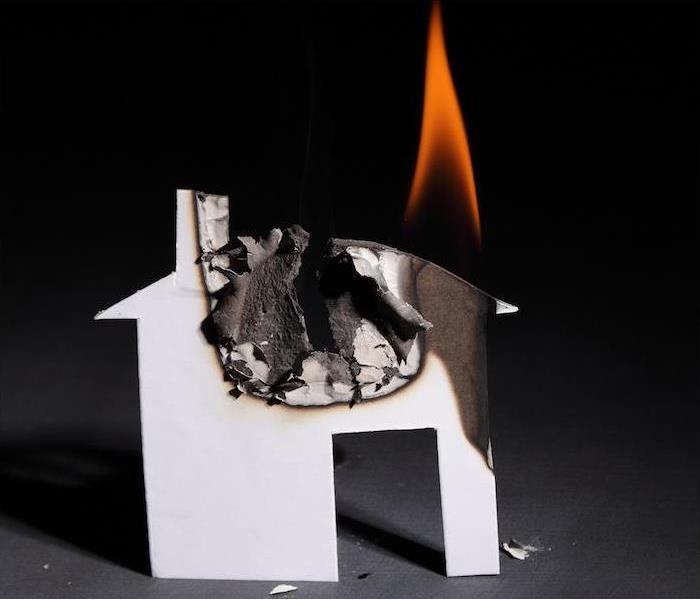 If your home or business has any damage, SERVPRO of Conway & Faulkner Counties is ready around the clock to help you recover.
If your home or business has any damage, SERVPRO of Conway & Faulkner Counties is ready around the clock to help you recover.
Do you remember what a tetrahedron is? For some of us, it’s been a while since we had a geometry quiz so to save us all time—it’s a three-dimensional, triangular shape with four equal sides.
This relates to fire safety because there is something called a fire tetrahedron. This is a way of saying that it requires four components for a fire to live. With only one component missing, a fire will die.
The 4 Things a Fire Needs to LiveFuel. The saying “just adding fuel to the fire,” is what we think of when we see that fire needs fuel. The fuel can be things like wood, plastic or other sources. Essentially, it’s something that can easily be burned.
Heat. We are taught as young children that fire is hot. So it’s only logical to know that once something is exposed to heat, it will eventually ignite of melt.
Oxygen. Oxygen is what helps breathe life into anything—and that includes fire. Oxygen provides an expanding series of chemical reactions that actually generate the combustion process.
Chemical Chain Reaction. Things always cause a type of chain reaction. In the case of a fire, this is what continues to feed a fire.
The 4 Ways to Stop a FireCool it. When you see a fire, your immediate reaction is to douse it with water. Which is smart, seeing that cooling it down is one of the best ways to put a fire out. It’s important to remember, though, that because of the high heat, it will likely take lots of water to put a fire out.
Smother it. Sometimes a fire can’t get cooled off enough, so therefore, the best thing you can do is remove the oxygen that it’s feeding off of! Removing the oxygen by smothering it will quickly help a fire go out.
Starve it. If you starve something from the things it needs, it will eventually die. The same is true for a fire—starve it from fueling agents, oxygen or heat, and it will eventually come to a natural end.
Interrupt the chain reaction. The last thing you can do is to interrupt the chain reaction, and you can do this by using chemical agents. A chemical agent called halon is particularly effective at this, but because it has an elevated potential for ozone depletion, it’s considered an environmental threat.
If the fire tetrahedron makes a wreck of your home or business, we’re ready around the clock to help you recover. Contact SERVPRO anytime for fast, thorough cleanup and recovery after a fire.
There’s No Curfew for Restoration Services | SERVPRO® of Conway & Faulkner Counties
2/1/2022 (Permalink)
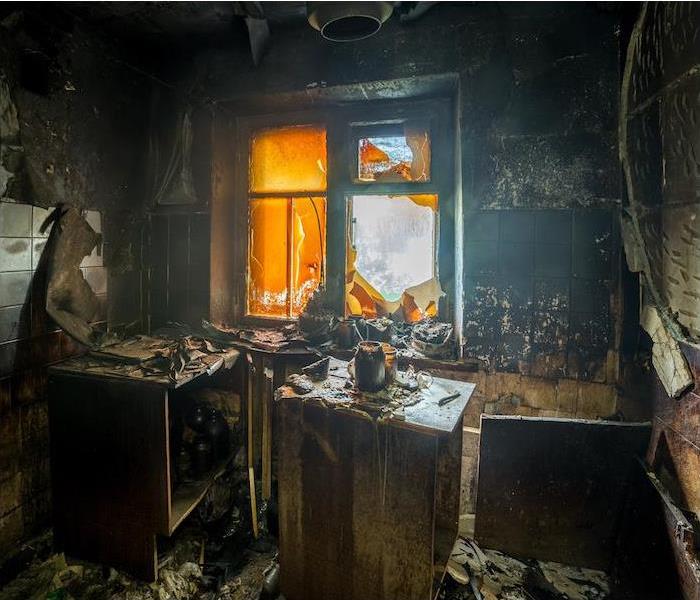 If a fire issue happens, remember the trusted leader in the recovery industry, SERVPRO of Conway & Faulkner Counties.
If a fire issue happens, remember the trusted leader in the recovery industry, SERVPRO of Conway & Faulkner Counties.
“Be home by midnight, and not a minute later!” That was the cardinal rule for most teens in the past, and you certainly didn’t text or call asking for an extension. Mainly because the technology didn’t exist.
Unlike then, we now have access to anything and everything right at our fingertips! And while we may be a bit spoiled, there are certain areas in which that instant communication is nice and sometimes necessary.
If your home or business has experienced a disaster or accident, instant communication is essential! That’s why we always have someone on call; our SERVPRO technicians know what it’s like and we are here for you.
After a fire. When you think about fire, you probably think about flames. And it’s definitely true—flames can do major damage. But there are other fire byproducts that can wreak havoc on your home, too.
With soot and smoke becoming the new home décor from top to bottom, you have a mess on your hands. These substances becomes embedded into fabrics, carpet or even walls of your home or business, making it almost impossible to clean on your own.
After water damage. When your house springs a leak or experiences some other type of water damage, prompt action is essential. If you don’t act fast, other problems can emerge. In fact, it only takes 48 hours or less before your water damage can also become mold damage.
And if your house or business is damaged and left unrestored for any period of time, additional damage can occur. A house left open to the elements, for example, may also sustain weather-related damage.
Our SERVPRO technicians are here for you, no matter the size or type of disaster! Call us and let the pros deal with the dirty work so that you don’t have to—we’ll get started fast.
When you need help after a home or business disaster, fast service is a priority, and there’s nobody faster or more prepared than SERVPRO. Call us anytime to take advantage of our 24-hour emergency service.
How House Fires Start | SERVPRO® of Conway & Faulkner Counties
11/10/2021 (Permalink)
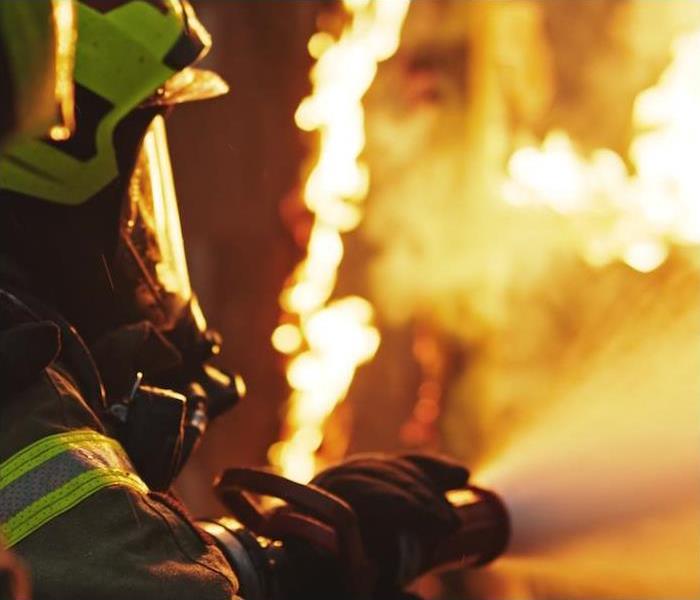 Regardless of the cause, SERVPRO of Conway & Faulkner Counties is here for you if your home is affected by fire.
Regardless of the cause, SERVPRO of Conway & Faulkner Counties is here for you if your home is affected by fire.
No one wants to see their home caught in a blazing, unpredictable fire. We all try every day to make wise decisions to help prevent this from happening.
However, despite an increased awareness of fire safety, more than a quarter of all reported fires still occur in the home.
Let’s work together in getting that number down by recognizing and staying aware of the top causes of house fires.
Cooking. Cooking is the leading cause of house fires and injuries, with unattended cooking primarily to blame. The best thing you can do to help prevent a fire is to stay in the kitchen while preparing food.
Heating equipment. Heating implements like portable space heaters are another main culprit in helping cause house fires. Heating equipment accounts for 14% of house fires. There can be a combination of things that can cause this, including mishaps and malfunctions. Placing heaters too close to something flammable is also a leading culprit in fires.
Electrical fires. Faulty wiring or a higher usage of electricity (especially in older homes) can also contribute to house fires. Something as simple as placing a higher wattage bulb into a lamp that requires low wattage or having frayed wiring can increase the risk of a house fire.
Intentional fires. There are more than 28,000 intentional home fires started every year. That means someone purposefully set a fire intent on destruction, rather than a fire set for other reasons that simply got out of hand.
Smoking materials. This particular risk is only responsible for 5% of house fire occurrences, but it’s the leading cause of civilian fire deaths. These fires are particularly deadly because they often occur when someone who is smoking falls asleep.
Regardless of the cause, SERVPRO is here for you if your home is affected by fire. Contact your local team today to see how we can help.
Fall Fire Tips | SERVPRO® of Conway & Faulkner Counties
10/19/2021 (Permalink)
You might have noticed, leaves are beginning to fall and there seems to be the perfect crisp chill in the air.
That’s right, the fall season is sneaking up on us quickly. If you’re an avid camper or outdoorsman, this very well could be your favorite season of the year.
Fall, while gorgeous, does present some potential fire hazards. So, curl up with a blanket and a latte and refresh your memory on some simple safety tips to remember this season.
Campfire Safety
Whether you are out camping in the peaceful woods, or you’re simply gathering around with family and friends, it’s important to remember that campfires can present a lot of risks.
Knowing where to put the fire, how to start it and how to put it out are some basic things that you need to consider.
For starters, your campfire should be away from anything flammable. You should start building your fire with dry leaves or twigs and add larger ones later once the fire is going. You should never use an accelerant like kerosene or lighter fluid.
After you have finished enjoying the campfire, you need to ensure that the fire is completely out before leaving the area. You can help make sure the fire is out by slowly dousing it with a bucket of water, which will help put out any remaining embers. As you may know, with burning embers, something as simple as a swift wind can help ignite the fire again.
Space Heaters
Portable space heaters can be very useful in lots of situations, but it’s also important to remember that they are among the most frequent causes of home fires in the fall and winter.
You will want to keep your space heater away from anything flammable on both sides. Also make sure to keep your space heater on a level surface and away from children or pets that could potentially knock it over.
While most space heaters now come with an automatic shutoff capability, this isn’t something you want to chance. Also, you should plug your space heater directly into an outlet, it’s not safe to plug it into an extension cord.
Halloween
Fall seems to be the beginning of many holidays. With Halloween quickly approaching, you need to remember that candles, decorations and even costumes can present some serious fire hazards. Make sure you are aware as you decorate and stay attentive when you celebrate!
If a fire hazard should turn from potential to reality in your home, remember the trusted leader in the recovery industry and contact SERVPRO to get your property fully restored right down to the smell of smoke.
Vandalism That Turns Into Fire Damage
9/21/2021 (Permalink)
As a commercial property owner you probably do everything you can to keep a fire from happening, but unfortunately things happen that are out of the hands of property owners, like vandalism. That is why you should purchase fire insurance for the premises and make sure that your policy covers vandalism.
Our office receives several calls a year from property owners who have fire damage from someone breaking in and vandalizing their property. We recently provided services for a church where someone broke in and started a fire in the pastors office. This caused severe damage to the area the fire started and smoke damage through out the church. The water and foams that were used to suppress this fire caused damage to the building as well.
Having insurance on your commercial building can help pay for the cost of repairs caused by the fire and the fire suppression materials. Without proper insurance coverage, you might have to pay for the cost of the damage on your own. This could be devastating to your business.
It is relatively easy to get insurance on your commercial property. Most insurance agents can offer commercial property policies and your local agent will be able to help you get the best policy for your commercial property. Keep in mind, that there are typically different policies to choose from, it is always a good idea to speak to someone you trust who can help you make the right decision for you and your property.
If your commercial property has unfortunately been affected from fire damage we can provide a free inspection and help get your commercial property up and running for business. Give us a call at 501-328-3301 and we can help you through the process.
What You Can Expect From Us When A Fire Occurs
2/12/2021 (Permalink)
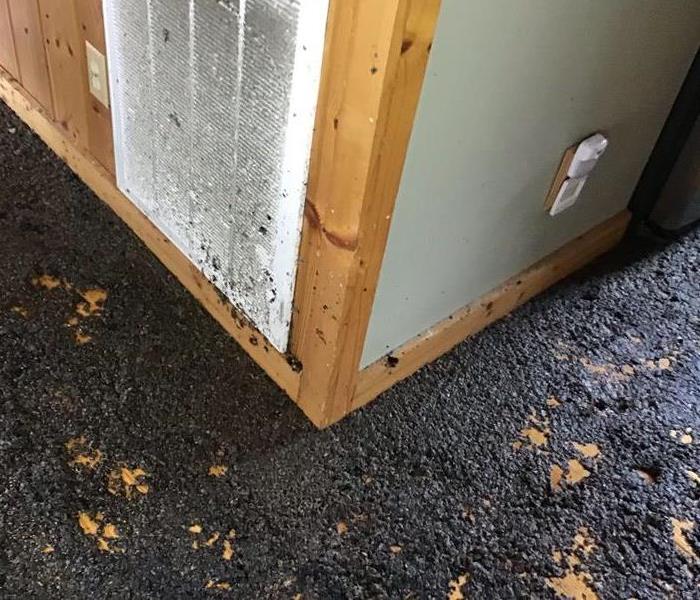 Soot damage from a fire that started in the chimney and affected the entire home.
Soot damage from a fire that started in the chimney and affected the entire home.
When a fire happens in your home or business the first 48 hours is important. It can make the difference between restoring vs replacing your property and personal belongings. SERVPRO of Conway & Faulkner Counties provides timely response ranging from fire, smoot, and smoke removal to content inventory.
Here is what you can expect from us in your home or business:
- Within 1 hour from notice of loss a priority responder will contact you.
- Within 4 hours of loss notification our certified technicians will be onsite to access the damage and walk you through the job process step-by-step, explaining what to expect and the anticipated outcome.
- Within 8 hours of the on-site visit our certified technicians will begin working to preclean for restoration so no further damage from soot or smoke occurs. We will also be in close contact with your insurance adjuster if a claim has been filed.
- Once we are finished there will be a final walk through with you and the priority responder.
If you have had a fire in your home or business, you can reach us 24 hours a day at 501-328-3301 for a free inspection and we can help you with any questions you might have.
What Your Kids Should Know When Their is a Home Fire
2/12/2021 (Permalink)
What Your Kids Need to Know About a House Fire
A house fire can happen fast and cause lots of damage in a short amount of time. Your property can be restored thanks to specialists. That is why it is more important to protect your family.
Children can get nervous or anxious when they see a fire in their home. That is why it is important to teach your children fire safety tips. You should regularly practice the below safety tips with your children. This way, they will know exactly what to do during an emergency.
Safety tips to teach your children:
- Roll Out of Bed
Fires often occur while you’re sleeping. Your children should not sit up in bed while there is smoke or a blaze in their room. This could expose them to intense temperatures. When practicing your kid’s safety plan, let them know they should roll out of bed and onto the floor. - Test the Doors
Children should understand that they should place the back of their hands against a door before opening it. If the door is hot, they should stay where they are or find another way out. Crawl Through the Home
To prevent smoke inhalation and burns, children should crawl underneath the fire. The basic crawl involves getting on all fours and keeping the nose pointed at the floor.
If the heat from the is powerful, you should also teach your kids a crawl where they keep their legs parallel to the floor.
Get to Safety If Trapped
Your children should also know what to do when an escape is not possible. Tell them that they should get to a room with a door and a window and they should then close the door and open the window. They can then either climb out the window or yell for help.
Smoke Alarms Save Lives!
2/12/2021 (Permalink)
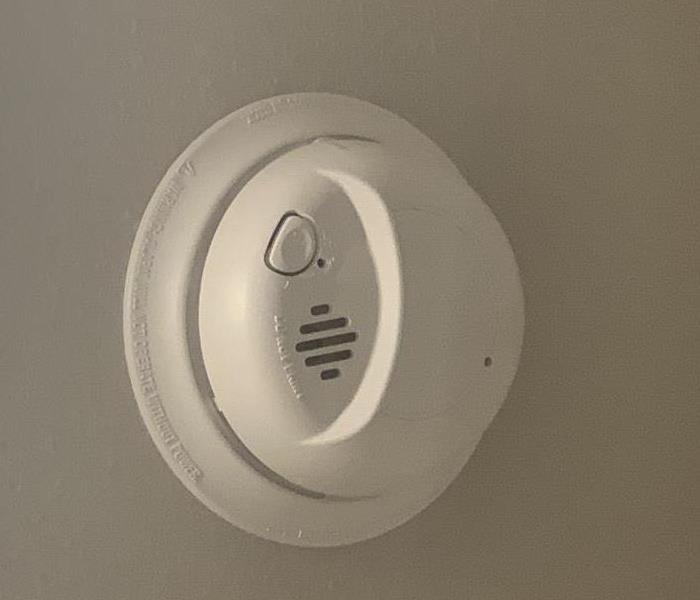 Smoke Alarms can Save Lives
Smoke Alarms can Save Lives
Smoke Alarms Save Lives!
When properly installed and maintained smoke alarms save lives according to the National Fire Protection Association (NFPA).
Smoke alarms should be in every bedroom and on every level in your home, including the basement. In office and commercial environments, check your state requirements or contact your local Fire Marshall to help ensure all codes are met.
Monthly you should test your smoke alarms with the test button. There are smoke alarms that have non-replaceable batteries, these should be replaced every ten years. Batteries in other alarms need replaced every year, and the unit replaced every ten years. If the alarm chirps signaling low battery, take the proper steps to replace the unit or the batteries immediately. You never want to disable or remove the battery from an alarm. Almost half of fires where smoke alarms were present but did not activate had missing or disconnected batteries (NFPA).
If you need help installing, testing or changing batteries in your smoke alarms, contact an electrician, your local fire department, or the American Red Cross.
Be sure your home or workplace has a fire emergency plan in place and conduct regular fire drills. For more information on Emergency Preparedness, contact SERVPRO of Conway & Faulkner Counites at 501-328-3301.
Smoking Cigarettes Can Cause a Fire? Really?
2/12/2021 (Permalink)
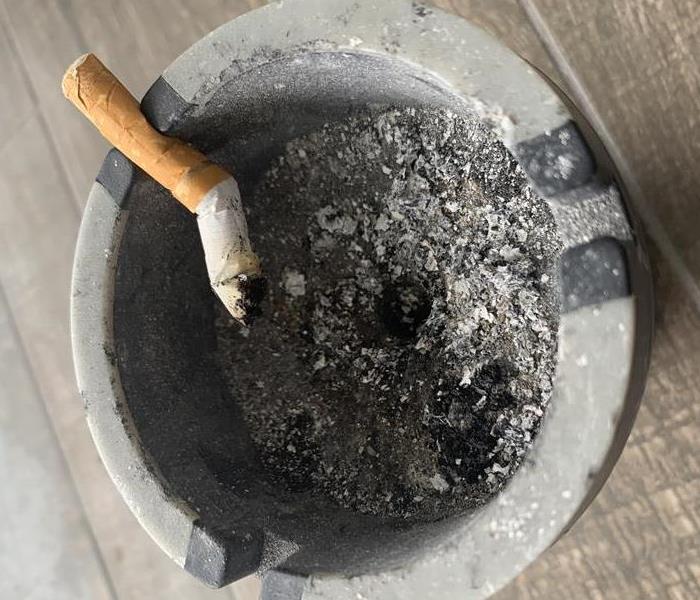 Smoking cigarettes can cause house fires and can be deadly.
Smoking cigarettes can cause house fires and can be deadly.
Thousands of residential fires are linked to smoking each year. Smoking may not be the best habit, and you might wonder how smoking can lead to a fire. There are several ways that cigarette butts can ignite a fire.
- Throwing a cigarette butt in the trash
- Using items for ashtrays that are improper
- Throwing a cigarette butt down outside
Here are some ways to prevent any flames from a cigarette.
- Do not Use Plants or the Ground as an Ashtray-It can be tempting to throw your cigarette down in the backyard, or in the bushes. But dry grass and leaves can easily catch on fire from a smoldering cigarette butt. You want to find an ashtray or make sure stamp the butt out.
- Never Smoke Sleepy- Smoking while sleepy can be deadly. Falling asleep on a couch or in a bed with a lit cigarette can lead to embers igniting fabric and the results can be fatal.
- Don’t Smoke Indoors-Some people still smoke inside the home. Smoking outdoors removes the risk of an ashtray fire, or butts of ashes igniting curtains, furniture or flammable items and leaves your home smelling good.
Smoking can pose a significant fire risk. Use the tips above and learn what not to do. Should your home be affected by a cigarette fire, call a remediation specialist that you can trust. You can SERVPRO of Conway & Faulkner Counties at 501328-3301 24 hours a day, 7 days a week.
Fire Damage in Vilonia, Arkansas
1/18/2021 (Permalink)
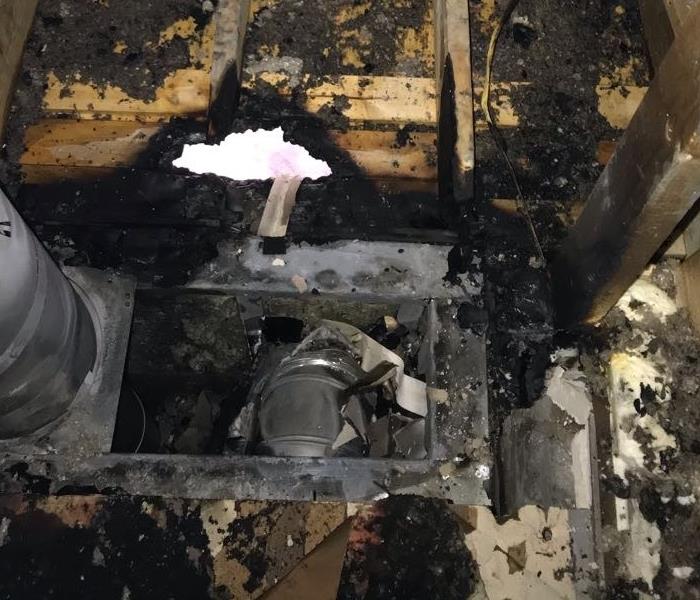 Damage from a Chimney in the Attic
Damage from a Chimney in the Attic
A fire started in the chimney of this Vilonia home, and caused damage to several rooms in the home, including the attic. This picture shows the damage that occurred in the Attic of this home.
SERVPRO of Conway & Faulkner Counties was called to inspect the loss to see if we could clean the soot and smoke damage. We were able to clean the smoke and soot damage that occurred and get it ready for reconstruction services.
We receive calls every year from fires that begin in a chimney. There are several things that you can do to make sure this doesn't happen to your home.
Many times a chimney fire will go undetected, here are some indications that you have had a chimney fire from the Chimney Safety Institute of America:
Nine Signs that You’ve Had a Chimney Fire
Since a chimney, damaged by a chimney fire, can endanger a home and its’ occupants and a chimney fire can occur without anyone being aware of them it’s important to have your chimney regularly inspected by a CSIA Certified Chimney Sweep. Here are the signs that a professional chimney sweep looks for:
- “Puffy” or “honey combed” creosote
- Warped metal of the damper, metal smoke chamber connector pipe or factory-built metal chimney
- Cracked or collapsed flue tiles, or tiles with large chunks missing
- Discolored and/or distorted rain cap
- Heat-damaged TV antenna attached to the chimney
- Creosote flakes and pieces found on the roof or ground
- Roofing material damaged from hot creosote
- Cracks in exterior masonry
- Evidence of smoke escaping through mortar joints of masonry or tile liners
Here is the link for further information about chimney fires.
https://www.csia.org/chimneyfires.html
If you have had a fire at your home or business. Give SERVPRO of Conway & Faulkner Counties a call at 501-328-3301 and we can come out to give you a free estimate.
Smoke Alarms=Lives Saved
5/20/2020 (Permalink)
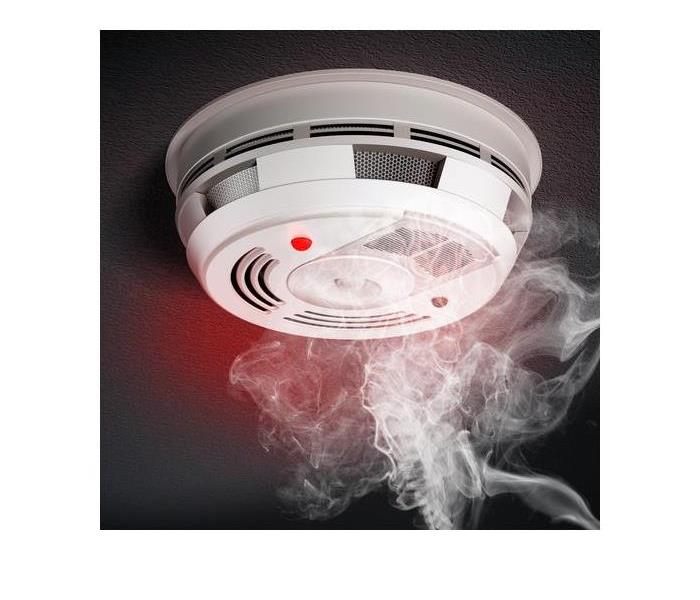 Having smoke alarms in your home or business saves lives
Having smoke alarms in your home or business saves lives
It is especially important to have smoke alarms in your home. When properly installed and maintained, smoke alarms save lives according to the National Fire Protection Association (NFPA).
In your homes, smoke alarms should be in every bedroom and on every level, including the basement. In office and commercial environments, check with your state requirements or contact your local Fire Marshall to help ensure all codes are met.
Test smoke alarms monthly using the test button. Smoke alarms with non-replaceable batteries need the entire smoke alarm unit replaced every ten years. Other alarms need batteries replaced every year, and the unit replaced every ten years. If the alarm chirps signaling low battery, take the proper steps to replace the unit or the batteries immediately. Never disable or remove the battery from an alarm. Almost half of fires where smoke alarms were present but did not activate had missing or disconnected batteries (NFPA).
In larger commercial facilities, hard wired or wireless smoke alarms offer benefits such as not needing to be tested as often and activating throughout the entire building if smoke is detected in just one area (NFPA).
If you need help installing, testing or changing batteries in your smoke alarms, contact your local fire department, an electrician or the American Red Cross.
Be sure your home or workplace has a fire emergency plan in place and conduct regular fire drills. For more information on Emergency Preparedness, contact SERVPRO of Conway & Faulkner Counties at 501-328-3301.
Electrical Fire: Now what?
5/20/2020 (Permalink)
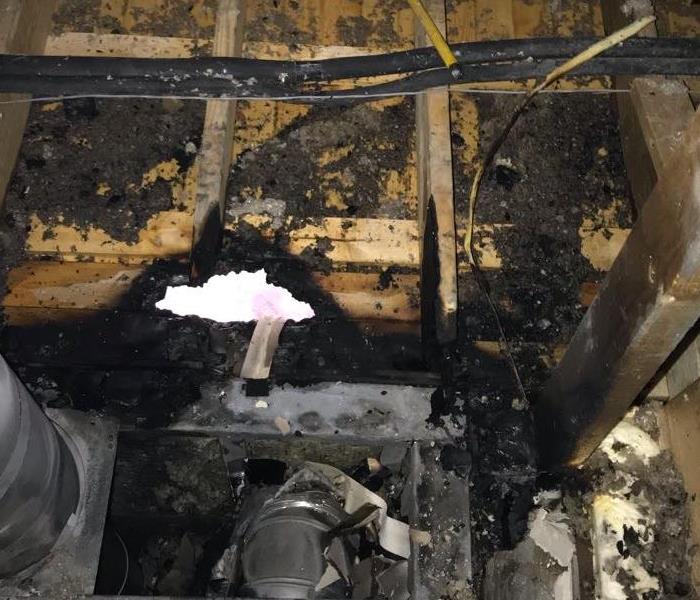 Electrical fire that started in the attic.
Electrical fire that started in the attic.
Faulty wires can cause a residential fire and inflict a lot of damage to the homeowner's property and many people are unaware that they have faulty wiring in their homes. Few things are as terrifying and stressful as watching flames consume your home and personal belongings.
If you have found yourself in this situation, you are probably wondering what you can do to repair the fire damage and to remove the lingering smoke odor. Fortunately, there are ways that a fire restoration team can fix your smoke damaged home and help you salvage your property.
Here is what to expect from our fire restoration teams:
One Hour: Within one hour from notice of loss, a priority responder will contact you.
Four Hours: Within four hours of loss notification, our certified technicians will be onsite to assess the damage.
Eight Hours: Within eight hours of on-site arrival, certified technicians will be working neatly and efficiently to clean, restore, and deodorize. Pre-cleaning for restoration, to prevent any further damage from soot and smoke.
Detailed Explanation: A trained and uniformed technician will walk you through the job process step-by-step, explaining what to expect and the anticipated outcome. We then use state-of-the-art restoration techniques to ensure your home or business is back to normal in an appropriate timeframe.
Final Walk-through: After the work has completed, a final walk-through will be conducted with you to help ensure your satisfaction.
We know that dealing with an electrical fire can cause a lot of stress, but you don’t have to face the problem alone. Call SERVPRO of Conway & Faulkner Counties at 501-328-3301 if you have any questions about fire damage for your home or business.
Facts About Smoke and Soot Damage
2/3/2020 (Permalink)
Smoke and soot can cause hidden damage and odor to your home or business. Our SERVPRO of Conway & Faulkner Counties production crews are experts when it comes to smoke damage who can accurately assess the extent of the damage to develop a plan of action.
Facts about Smoke and Soot
Hot smoke migrates to cooler areas and upper levels of a structure.
Smoke flows around plumbing systems, seeping through the holes used by pipes to go from floor to floor.
The type of smoke may greatly affect the restoration process.
Different Types of Smoke
Did you know there are actually different types of smoke damage? There is what is called wet smoke and dry smoke. Listed below you will find two types in more detail.
Wet Smoke/Plastic and Rubber
Low heat, smoldering, pungent odor, sticky, smeary. This type of smoke damage is harder to clean.
Dry Smoke/Paper and Wood
Fast burning, high temperatures, heat rises, therefore, smoke rises.
Protein Fire Residue/Evaporation of material
Virtually invisible, discolors paints and varnishes, extreme pungent odor.
In the unfortunate event of smoke damage , we are available 24/7. Call us at 501-328-3301.
What To Do After A Fire Damage Has Occurred
2/3/2020 (Permalink)
SERVPRO of Conway & Faulkner Counties knows how devastating a fire can be to your home or business. It leaves behind soot, smoke damage and a host of other problems. Fire damage will affect not only the structure of your property, but also the contents. It will most likely need thorough professional cleaning. If your home or business suffers a fire, it is important to take the appropriate steps to prevent further damage until help arrives. The following tips may help reduce damage and increase the chances of a successful restoration:
Limit movement in the home to prevent soot particles from being embedded into upholstery and carpet
Keep hands clean. Soot on hands can further soil upholstery, walls, and woodwork. Place dry, colorfast towels or old linens on rugs, upholstery, and carpet traffic areas
If electricity is off, empty freezer/ refrigerator completely and prop doors open to help prevent odor
Wipe soot from chrome kitchen/ bathroom faucets, trim and appliances, then protect these surfaces with a light coating of lubricant
Tape double layers of cheesecloth over air registers to stop particles of soot from getting in or out of the HVAC system
Clean aluminum window panes to prevent them from being permanently damaged.
Call SERVPRO of Conway & Faulkner Counties at (501) 328-3301, if you have had a fire and we can help answer your questions and also provide you with a free estimate.
Fires...Every Second Counts
2/3/2020 (Permalink)
In a fire every second counts. Seconds can mean the difference between residents of our community escaping safely from a fire or having their lives end in tragedy.
Here are some things to implement with your family so that you are prepared in case there is ever a fire in your home. Remember that a small amount of preparation could mean all the difference to you and your loved ones.
Draw a map of your home with all members of your household, marking two exits from each room and a path to the outside from each exit.
Practice your home fire drill twice a year. Conduct one at night and one during the day with everyone in your home, and practice using different ways out.
Teach children how to escape on their own in case you can’t help them.
Make sure the number of your home is clearly marked and easy for the fire department to find.
Close doors behind you as you leave – this may slow the spread of smoke, heat, and fire.
Once you get outside, stay outside. Never go back inside a burning building.
Contact your local fire department and see how you can get involved with them and ask them what else you can do to prevent a fire from happening. Sometimes they will have events or give out smoke detectors for your home. Don't think this could never happen to you because it easily could, so be prepared. We don't have control over everything in our homes. Have a plan and be safe!
Fire Safety For Pets
5/29/2019 (Permalink)
Pets? More Like Family!
A fire emergency can hit when you least expect it. SERVPRO understands the need and importance to have an evacuation plan for all members of the family. While you should always be most focused on keeping you and your family safe, you should also spend time on creating a pet evacuation plan. Pet preparation gives you a better chance of getting your pets out of danger as well. Here are some tips to create a great pet evacuation plan:
Practice Evacuating
Emergencies can make it hard to think of everything you need to do in that second. It is important to practice your plan so you will be better prepared if the emergency ever occurs. This can be helpful for all members of the family regardless if they have two or four legs.
Evaluate Your Pets
Its not possible to have your eyes on your pets at every moment of the day. You don't want to put yourself at risk by searching for your dog or cat during a fire emergency, so its important to know where they typically go if frightened. If you know your pets typical hiding spots, it can be easier to find them in an emergency.
Keep Collars and Leashes Handy
Fires are frightening to everyone, but they are especially frightening to dogs. By keeping their collars and leashes handy, you can more easily guide them out of the house. If you are unable to find them, it can be easier for the fire department to get them out if they are wearing collars. It can be a good idea to hang leashes by the door you are planning to evacuate through.
Vacation Plan
Everyone has a different preference of pet care when they are on vacation. Emergencies can happen while you are away, so it is important to still have a plan for your pets. We suggest having a trusted individual stay at your home with your pets or boarding them at a local business like Hounds Hideaway. By doing either of these, your pets time alone and unmonitored is limited.
We are ready to help at anytime of the day. Call SERVPRO of Conway & Faulkner Counties at 501-328-3301.
24-Hour Fire Damage Repair and Restoration
5/29/2018 (Permalink)
A house fire is never expected nor welcome. If your home ever suffers the damage of a fire, the situation can be very overwhelming and stressful. Fire and smoke damage are caused by the fire, but water damage can also be involved because of efforts to extinguish the fire. SERVPRO of Conway and Faulkner Counties has the experience along with the fire and water damage equipment to help you through this tragedy. Highly trained fire restoration technicians will be able to restore for your home and belongings with the utmost care.
We strive to make this crisis as easy as possible. If you suffer a fire damage event, please contact us with any questions.
Have Questions? Call Us Today – (501)-328-3301
Fire Damage Restoration Services
Each fire is different therefore it creates different damage. We tailor to each specific fire to restore the home or business to the original setting. The steps below are offered to illustrate the process for the typical fire damage restoration.
- Emergency Contact
- Inspection and Fire Damage Assessment
- Immediate Board-Up and Roof Tarp Service (if needed)
- Water Removal and Drying (if water damage is present)
- Removal of Smoke and Soot from all Surfaces
- Cleaning and Repair
- Restoration
Have Questions about Fire, Smoke, or Soot Damage?
Call Us Today – (501) 328-3301
Fire Damage Emergency Tips
5/29/2018 (Permalink)
What you can do until help arrives
After any fire damage situation, your primary focus should be safety first:
- Is it safe to stay in the house?
- Electrical and "slip and fall" hazards are some of the most prevalent concerns.
- Only do activities that are safe for you to perform.
- Wet materials can be VERY heavy. Be careful!
Have Smoke or Fire Damage? Call (501) 328-3301
What To Do After A Fire
- Limit movement in the home to prevent soot particles from being embedded into upholstery and carpets.
- Keep hands clean so as not to further soil upholstery, walls and woodwork.
- Place clean towels or old linens on rugs, upholstery and carpet traffic areas.
- If electricity is off, empty freezer and refrigerator and prop doors open.
- Clean and protect chrome with light coating of petroleum jelly or oil.
- Wash houseplants on both sides of leaves.
- Change HVAC filter.
- Tape double layers of cheesecloth over air registers.
What NOT To Do After A Fire
- Don't attempt to wash any walls or painted surfaces or shampoo carpet or upholstery without contacting us.
- Don't attempt to clean any electrical appliances that may have been close to fire, heat or water without consulting an authorized repair service.
- Don't use any canned or packaged food or beverages that may have been stored near the fire, heat or water.
- Don't turn on ceiling fixtures if ceiling is wet. The wiring may be damaged.
- Don't send garments to an ordinary dry cleaner. Improper cleaning may set smoke odor.
SERVPRO of Conway & Faulkner Counties Provide Tips to Avoid Common House Fires
5/23/2018 (Permalink)
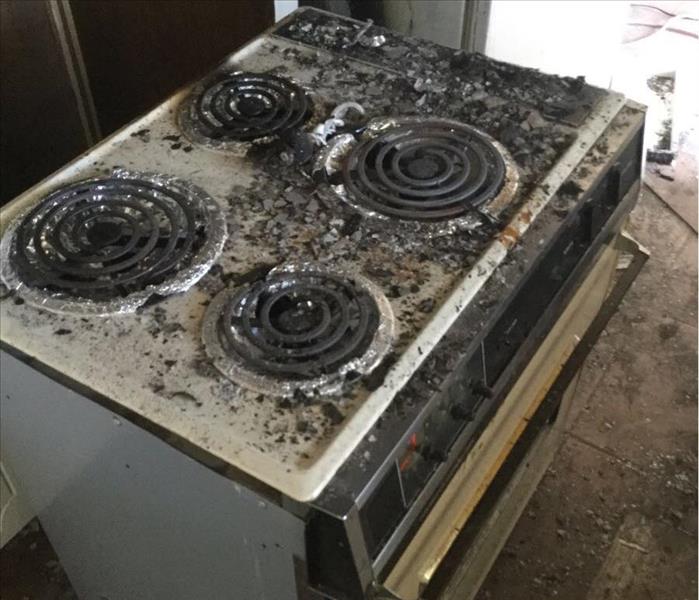 Cooking fire caused by an unattended stove in Conway home.
Cooking fire caused by an unattended stove in Conway home.
House fires can be caused by several different factors, but all of these fires will have invasive smoke damage. Our expertise allows us to work with the effects of different fires that have affected your home. House fires can be a surprise, but there are preventive steps to take to avoid these disasters.
Top five causes of house fires:
- Cooking fires. Grease is extremely flammable, and it should be supervised at all times while hot. Once the flames start, they are difficult to stop.
- Candles can be considered dangerous if left unattended. All matches and candles should be out of the reach of children to prevent accidental fires.
- Electrical fires can result from faulty wiring or an outlet being overloaded. We advise having your home checked by a professional electrician especially if the house is older.
- Chemical fires are more common during the summer. If cleaning chemicals or other flammable liquids get too hot, they either ignite or explode. Be cautious and read all labels on chemicals to make sure they are stored in the right environment.
- Heat sources like home heaters should never be left on while the house is empty. We advise inspecting the heater before using it to make sure it is in good condition.
Our Fire Damage Restoration Services
Each smoke and fire damage situation is different. We will have a tailored solution for the specific situation. We have the equipment, expertise, and experience to restore your fire and smoke damage. We will also treat your family with empathy and respect and your property with care.
Have Questions about Fire, Smoke, or Soot Damage?
Call Us Today- 501-328-3301
SERVPRO of Conway & Faulkner Counties provides fire, soot and water damage restoration service
3/8/2018 (Permalink)
The active wildfires here in Southern California are increasing their impact as growing Santa Ana winds add fuel to these devastating blazes that are encroaching in our area. According to the New York Times, new fires broke out in Malibu on December 7, with at least 96,000 acres already burned in the Ventura area and 116,000 acres in Los Angeles County. Evacuations have closed hundreds of schools and forced 200,000 of our neighbors to seek safety. The “Thomas Fire” in the Ventura area continues to burn with the aid of strong winds. This fire has caused the closure of the 101 freeway and a boil-water advisory was issued for Ventura County. Santa Ana winds The Santa Ana winds that are enabling the fires to rapidly increase their reach can have speeds in excess of 60 miles per hour. They are not expected to diminish until Friday into Saturday at the earliest. The National Weather Service has warned of “very rapid fire growth” in this area. SERVPRO Meteorologist Lela Davis said that the Santa Ana winds were already very dry when they reached the Southern California valley, allowing them to quickly pull moisture out of vegetation, increasing the risk for wildfires. For the first time ever, a purple wind warning was issued for today under the color-coded system used to advise about high winds. This purple warning pushed wind expectations from the “high” category to “extreme”. Ready to help Here at SERVPRO of Conway & Faulkner Counties we are monitoring this wildfire situation closely. Our thoughts are with those neighbors who may be put in harms’ way during this event. In many cases, a wildfire can result in a total loss for a home or business, but in others it may be a partial loss, or can result in mild smoke damage. If your home or business is affected by a wildfire, SERVPRO of Conway & Faulkner Counties is Here to Help®.
About SERVPRO of Conway & Faulkner Counties
SERVPRO of Conway & Faulkner Counties specializes in the cleanup and restoration of residential and commercial property after a fire, smoke or water damage event. Our staff is highly trained in property damage restoration. From initial and ongoing training at SERVPRO’s corporate training facility to regular IICRC-industry certification, rest assured our staff is equipped with the knowledge to restore your property.
Conway, AR Smoke and Soot Cleanup
5/10/2016 (Permalink)
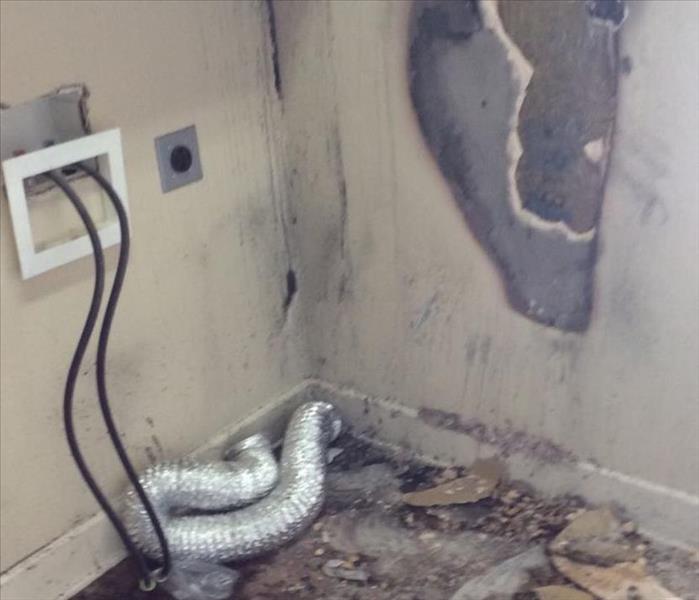 Smoke and Soot Damage Can Cause a Pervasive Odor in Your Conway, AR Home.
Smoke and Soot Damage Can Cause a Pervasive Odor in Your Conway, AR Home.
Smoke and soot is very invasive and can penetrate various cavities within your home, causing hidden damage and odor. Our smoke damage expertise and experience allows us to inspect and accurately assess the extent of the damage to develop a comprehensive plan of action.
Smoke and soot facts:
- Hot smoke migrates to cooler areas and upper levels of a structure.
- Smoke flows around plumbing systems, seeping through the holes used by pipes to go from floor to floor.
- The type of smoke may greatly affect the restoration process.
Different Types of Smoke
There are two different types of smoke–wet and dry. As a result, there are different types of soot residue after a fire. Before restoration begins, SERVPRO of Conway & Faulkner Counties will test the soot to determine which type of smoke damage occurred. The cleaning procedures will then be based on the information identified during pretesting. Here is some additional information:
Wet Smoke – Plastic and Rubber
- Low heat, smoldering, pungent odor, sticky, smeary. Smoke webs are more difficult to clean.
Dry Smoke – Paper and Wood
- Fast burning, high temperatures, heat rises therefore smoke rises.
Protein Fire Residue – Produced by evaporation of material rather than from a fire
- Virtually invisible, discolors paints and varnishes, extreme pungent odor.
Our Fire Damage Restoration Services
Since each smoke and fire damage situation is a little different, each one requires a unique solution tailored for the specific conditions. We have the equipment, expertise, and experience to restore your fire and smoke damage. We will also treat your family with empathy and respect and your property with care.
Have Questions about Fire, Smoke, or Soot Damage?
Call Us Today – 501-328-3301




 24/7 Emergency Service
24/7 Emergency Service














